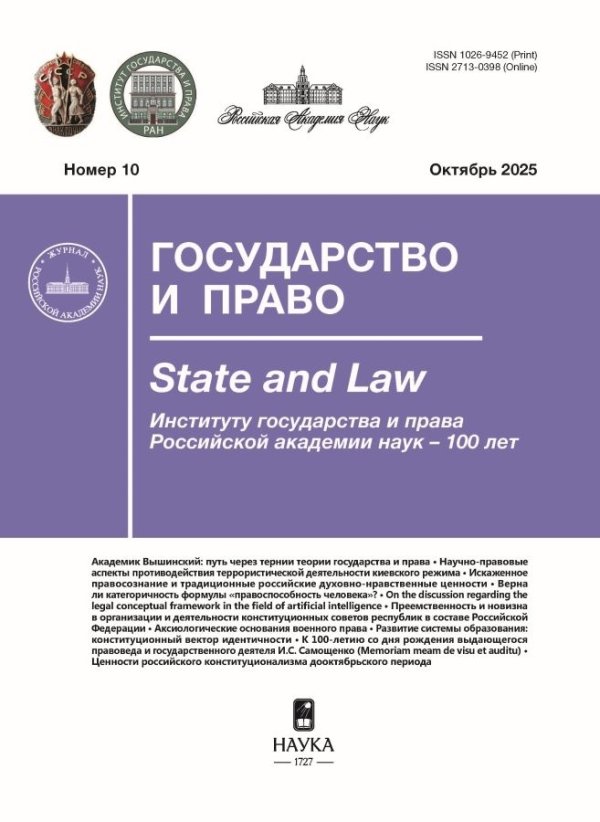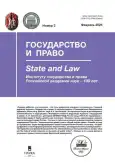Philosophy of Law by I. Kant: an authentic interpretation
- Authors: Zhukov V.N.1,2
-
Affiliations:
- Lomonosov Moscow State University
- Institute of State and Law of the Russian Academy of Sciences
- Issue: No 2 (2025)
- Pages: 14-23
- Section: Legal, political, philosophical and religious thought
- URL: https://rjsvd.com/1026-9452/article/view/682837
- DOI: https://doi.org/10.31857/S1026945225020012
- ID: 682837
Cite item
Abstract
The article examines the Philosophy of Law by I. Kant in the context of his epistemology and ethics. The article provides material that has often been ignored by Russian researchers. In our and European literature, it is customary to consider Kant’s political and legal views as a philosophical generalization of the ideas of the Great French Revolution, which does not raise objections. At the same time, Kant’s liberalism was very contradictory and inconsistent, which is understandable: as an employee of the Prussian Monarchy (and a professor at the University of Konigsberg is a civil servant), he was obliged to coordinate his views with the existing absolutism in the country. Kant’s views on revolution, on the relationship between the individual and the state, in some places quite fit into the framework of typical authoritarianism. New material is given on Kant’s views on the problem of the form of the state.
Full Text
About the authors
Vyacheslav N. Zhukov
Lomonosov Moscow State University; Institute of State and Law of the Russian Academy of Sciences
Author for correspondence.
Email: pifagor2002@mail.ru
Doctor of Law, Doctor of Philosophy, Professor, Professor of the Department of Theory of State and Law and Political Science of the Faculty of Law at Lomonosov Moscow State University; Chief Researcher, Sector of Philosophy of Law, Theory and History of the State and Law, Institute of State and Law of the Russian Academy of Sciences; RAS expert
Russian Federation, 1 Leninskie Gory, bld. 13 (4th academic building), 119991 Moscow; 10 Znamenka str., 119019 MoscowReferences
- Asmus V. F. Ethics of Kant // Kant I. Essays: in 6 vols. / transl. from German; under the general ed. of V. F. Asmus, A. V. Gulyga, T. I. Oizerman. M., 1965. Vol. 4, part 1. P. 50 (in Russ.).
- Kant I. Towards eternal peace // Kant I. Essays: in 6 vols. / transl. from German; under the general ed. of V. F. Asmus, A. V. Gulyga, T. I. Oizerman. M., 1966. Vol. 6 (in Russ.).
- Kant I. Criticism of practical reason // Kant I. Essays: in 6 vols. / transl. from German; under the general ed. of V. F. Asmus, A. V. Gulyga, T. I. Oizerman. M., 1965. Vol. 4, part 1. P. 499 (in Russ.).
- Kant I. Metaphysics of morals. Part one. Metaphysical principles of the doctrine of law // Kant I. Essays: in 6 vols. / transl. from German; under the general ed. of V. F. Asmus, A. V. Gulyga, T. I. Oizerman. M., 1965. Vol. 4, part 2. Pp. 139, 143, 147, 152, 224–226, 232–239, 242–245, 267, 268, 270–283 (in Russ.).
- Kant I. Fundamentals of the metaphysics of morality // Kant I. Essays: in 6 vols. / transl. from German; under the general ed. of V. F. Asmus, A. V. Gulyga, T. I. Oizerman. M., 1965. Vol. 4, part 1. Pp. 260, 270 (in Russ.).
- Novgorodtsev P. I. Kant and Hegel in their teachings on law and the state. M., 1901. Pp. 112, 113 (in Russ.).
Supplementary files











